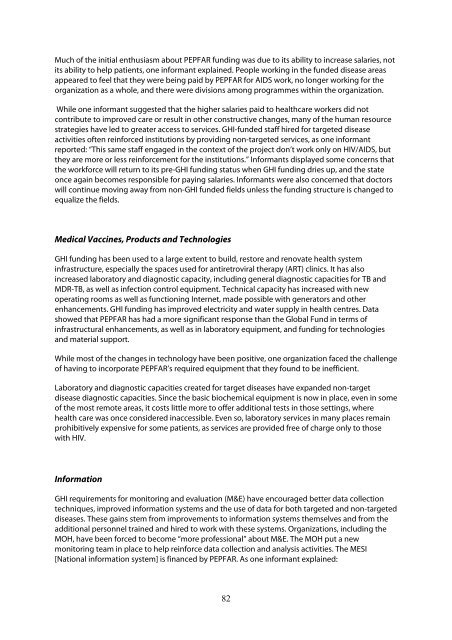MAXIMIZING POSITIVE SYNERGIES - World Health Organization
MAXIMIZING POSITIVE SYNERGIES - World Health Organization
MAXIMIZING POSITIVE SYNERGIES - World Health Organization
You also want an ePaper? Increase the reach of your titles
YUMPU automatically turns print PDFs into web optimized ePapers that Google loves.
Much of the initial enthusiasm about PEPFAR funding was due to its ability to increase salaries, not<br />
its ability to help patients, one informant explained. People working in the funded disease areas<br />
appeared to feel that they were being paid by PEPFAR for AIDS work, no longer working for the<br />
organization as a whole, and there were divisions among programmes within the organization.<br />
While one informant suggested that the higher salaries paid to healthcare workers did not<br />
contribute to improved care or result in other constructive changes, many of the human resource<br />
strategies have led to greater access to services. GHI-funded staff hired for targeted disease<br />
activities often reinforced institutions by providing non-targeted services, as one informant<br />
reported: “This same staff engaged in the context of the project don’t work only on HIV/AIDS, but<br />
they are more or less reinforcement for the institutions.” Informants displayed some concerns that<br />
the workforce will return to its pre-GHI funding status when GHI funding dries up, and the state<br />
once again becomes responsible for paying salaries. Informants were also concerned that doctors<br />
will continue moving away from non-GHI funded fields unless the funding structure is changed to<br />
equalize the fields.<br />
Medical Vaccines, Products and Technologies<br />
GHI funding has been used to a large extent to build, restore and renovate health system<br />
infrastructure, especially the spaces used for antiretroviral therapy (ART) clinics. It has also<br />
increased laboratory and diagnostic capacity, including general diagnostic capacities for TB and<br />
MDR-TB, as well as infection control equipment. Technical capacity has increased with new<br />
operating rooms as well as functioning Internet, made possible with generators and other<br />
enhancements. GHI funding has improved electricity and water supply in health centres. Data<br />
showed that PEPFAR has had a more significant response than the Global Fund in terms of<br />
infrastructural enhancements, as well as in laboratory equipment, and funding for technologies<br />
and material support.<br />
While most of the changes in technology have been positive, one organization faced the challenge<br />
of having to incorporate PEPFAR’s required equipment that they found to be inefficient.<br />
Laboratory and diagnostic capacities created for target diseases have expanded non-target<br />
disease diagnostic capacities. Since the basic biochemical equipment is now in place, even in some<br />
of the most remote areas, it costs little more to offer additional tests in those settings, where<br />
health care was once considered inaccessible. Even so, laboratory services in many places remain<br />
prohibitively expensive for some patients, as services are provided free of charge only to those<br />
with HIV.<br />
Information<br />
GHI requirements for monitoring and evaluation (M&E) have encouraged better data collection<br />
techniques, improved information systems and the use of data for both targeted and non-targeted<br />
diseases. These gains stem from improvements to information systems themselves and from the<br />
additional personnel trained and hired to work with these systems. <strong>Organization</strong>s, including the<br />
MOH, have been forced to become “more professional” about M&E. The MOH put a new<br />
monitoring team in place to help reinforce data collection and analysis activities. The MESI<br />
[National information system] is financed by PEPFAR. As one informant explained:<br />
82

















